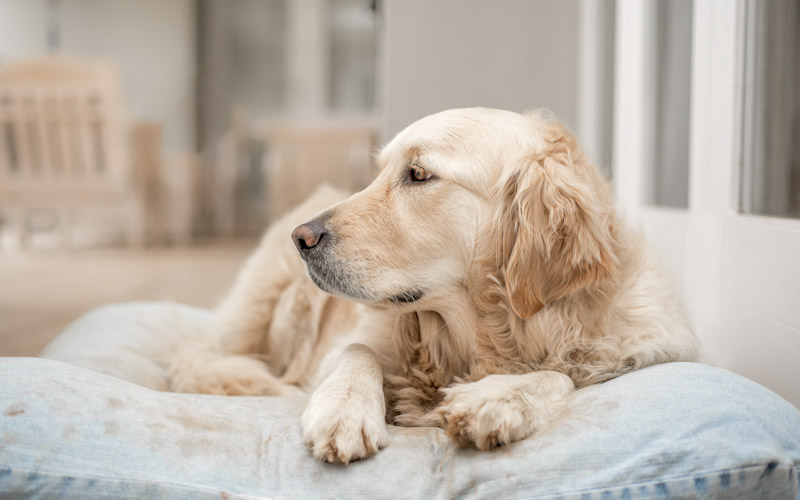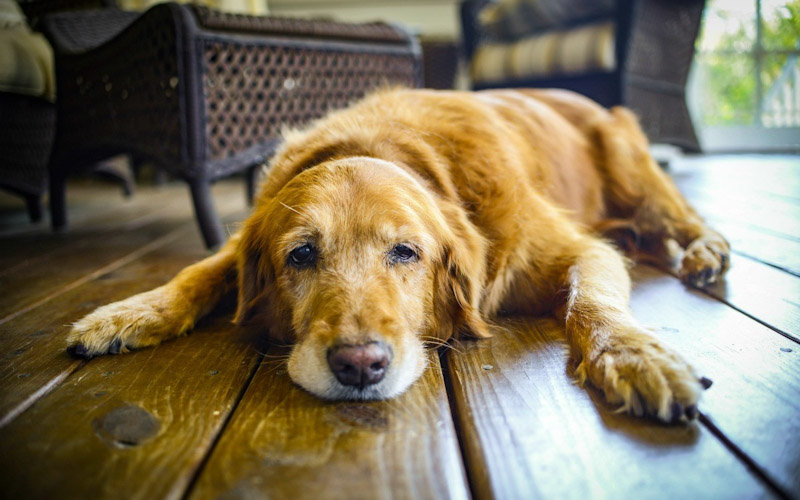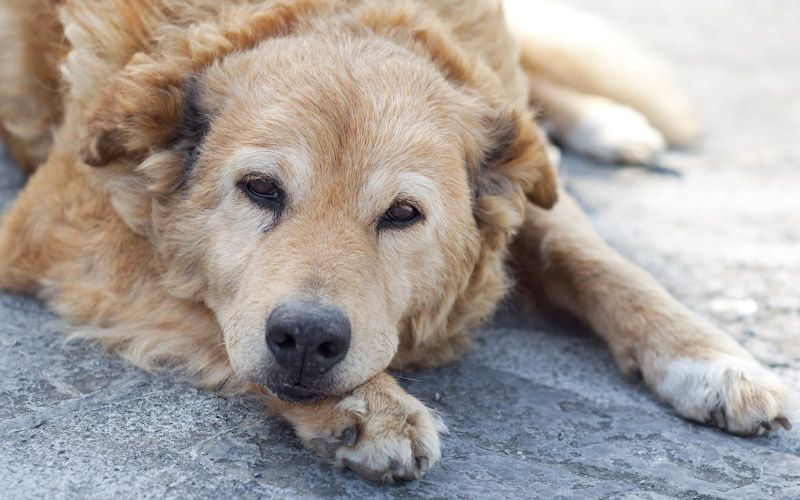Is your senior dog having accidents indoors? We understand how frustrating this can be. This guide offers solutions to help you understand and address the reasons behind your older dog’s peeing behavior and offers tips to prevent future accidents.

If you have an older dog, you may have noticed that they are not as good at holding their bladder as they used to be. You may find puddles or wet spots on the floor, or even catch your dog peeing in the house. This can be very upsetting and stressful for both you and your dog.
You may wonder why your dog is suddenly peeing in the house, and what you can do to stop it. Is it a sign of a serious health problem? Is it a behavioral issue? Is it something you are doing wrong?
The first thing you need to know is that your dog is not peeing in the house to spite you or to be naughty. There are many possible reasons why your older dog is having accidents indoors, and most of them are not under their control. In this article, we will explain some of the common causes of urination accidents in older dogs, and how you can help your dog overcome them. We will also give you some practical tips to prevent future accidents and keep your home clean and odor-free.
Understanding the Reasons Behind Your Dog’s Peeing
Before you can stop your older dog from peeing in the house, you need to understand why they are doing it. There are many factors that can affect your dog’s bladder control and peeing behavior, such as:
- Age-related medical conditions: As your dog gets older, they may develop certain health problems that can affect their urinary system, such as urinary tract infection, kidney disease, diabetes, bladder stones, prostate problems, or incontinence. These conditions can cause your dog to pee more frequently, have difficulty holding their urine, or leak urine involuntarily. Some of these conditions can also cause pain or discomfort, which can make your dog anxious or restless.
- Cognitive decline: Just like humans, dogs can experience cognitive decline as they age, which is sometimes called doggy dementia. This can affect your dog’s memory, learning, perception, and behavior. Your dog may forget their house training, get confused about where they are, or lose their sense of time. They may also become more fearful, anxious, or depressed, which can affect their peeing habits.
- Weakened muscles: As your dog ages, their muscles may lose strength and tone, especially in their pelvic area. This can make it harder for your dog to control their bladder and sphincter muscles, and cause them to leak urine when they sleep, sneeze, or exert themselves. This is more common in female dogs, especially after spaying, but it can also affect male dogs.
- Increased anxiety or stress: Older dogs may become more sensitive to changes in their environment or routine, such as moving to a new home, having new people or pets in the house, or being left alone for longer periods. These changes can cause your dog to feel anxious, stressed, or insecure, which can trigger peeing in the house. Your dog may also pee in the house to mark their territory or to seek attention or comfort from you.
- Changes in routine or environment: Older dogs may also have trouble adapting to changes in their potty schedule or location, such as having less access to the outdoors, having to use a different door or spot, or having to share their space with other dogs. These changes can confuse your dog or disrupt their peeing routine, and cause them to have accidents indoors.
These are some of the most common reasons why your older dog may be peeing in the house, but there may be other factors involved as well. That’s why it’s very important to consult your veterinarian as soon as you notice any changes in your dog’s peeing behavior. Your veterinarian can examine your dog, run some tests, and diagnose any underlying medical conditions that may be causing or contributing to your dog’s peeing problem. Your veterinarian can also prescribe medication, supplements, or other treatments to help your dog manage their condition and improve their bladder control.

Tips to Prevent Future Accidents
Once you have identified and addressed the reasons behind your dog’s peeing in the house, you can take some steps to prevent future accidents and help your dog stay clean and dry. Here are some tips to follow:
- Follow your veterinarian’s recommendations: Make sure you follow your veterinarian’s advice on how to treat your dog’s medical condition, if any. Give your dog the prescribed medication, supplements, or other treatments as directed. Monitor your dog’s peeing frequency, volume, color, and odor, and report any changes or concerns to your veterinarian. Schedule regular check-ups and follow-ups to monitor your dog’s progress and adjust the treatment plan if needed.
- Adjust your dog’s diet: You may need to make some changes to your dog’s diet to help them with their peeing problem. For example, you may need to limit your dog’s water intake before bedtime, to reduce the chances of them peeing at night. However, you should not restrict your dog’s water intake during the day, as this can lead to dehydration and urinary tract problems. You may also need to consider switching to a senior dog food formula, which may have lower protein, sodium, and phosphorus levels, to help your dog’s kidney function and urinary health. Consult your veterinarian for specific dietary recommendations for your dog.
- Establish a consistent potty schedule and routine: One of the best ways to prevent your older dog from peeing in the house is to establish a consistent and frequent potty schedule and routine. Take your dog outside to pee at least every 2 to 4 hours, depending on their condition and needs. Take your dog outside first thing in the morning, after meals, and before bedtime. Pay attention to your dog’s cues and take them out immediately when they seem restless, whine, pace, or start sniffing around. Use the same door, leash, and commands every time, and take your dog to the same spot, preferably one that is quiet, grassy, and away from distractions. This will help your dog associate peeing with going outside, and make it easier for them to hold their bladder indoors.
- Prevent accidents indoors: Sometimes, despite your best efforts, your older dog may still have accidents indoors. To prevent this, you may need to confine your dog to a smaller, puppy-proofed area when you can’t supervise them, such as a crate, a pen, or a room with a baby gate. This will limit the places where your dog can pee, and make it easier for you to clean up. You may also want to use washable pee pads in designated areas, such as near the door, under the bed, or on the couch, to protect your floors and furniture. However, you should not rely on pee pads as a substitute for taking your dog outside, as this can confuse your dog and reinforce their peeing behavior indoors.
- Clean up accidents thoroughly: If your dog does have an accident indoors, you need to clean it up thoroughly and promptly, to prevent any lingering odors or stains. Use an enzymatic cleaner, which can break down the urine molecules and eliminate the smell, rather than a regular cleaner, which may only mask the odor. Avoid using ammonia-based cleaners, as they can smell like urine to your dog and encourage them to pee in the same spot again. Blot up as much of the urine as possible with paper towels or rags, then spray the area with the enzymatic cleaner and let it sit for the recommended time. Then, blot up the excess cleaner and let the area dry completely. You may need to repeat the process several times for stubborn stains or odors.
- Use positive reinforcement: One of the most effective ways to stop your older dog from peeing in the house is to use positive reinforcement. This means praising your dog verbally and with treats every time they pee outside, and ignoring or redirecting them when they pee inside. This will help your dog learn that peeing outside is rewarding, and peeing inside is not. Avoid scolding or punishing your dog for peeing in the house, as this can worsen the behavior, by making your dog fearful, anxious, or confused. Instead, calmly interrupt your dog if you catch them in the act, and take them outside to finish their business. Then, praise them and give them a treat for peeing outside.

Conclusion
Having an older dog who pees in the house can be very challenging and frustrating, but it doesn’t have to be. By understanding the reasons behind your dog’s peeing behavior, and following the tips we have shared, you can help your dog overcome their peeing problem and prevent future accidents. Remember, your dog is not peeing in the house on purpose, and they need your patience, compassion, and support. You are not alone in this, and there are many resources and professionals who can help you and your dog. Don’t hesitate to consult your veterinarian or an animal behaviorist for further guidance if needed. With some time and effort, you and your dog can enjoy a clean and happy home together.
